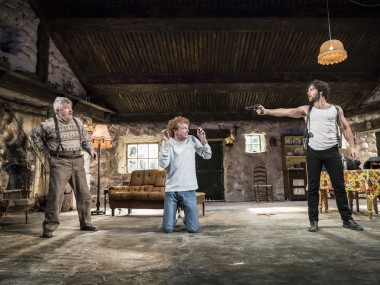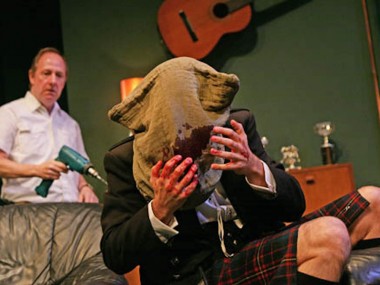Cyprus Avenue, Royal Court
Friday 22nd April 2016

Eric Miller is worried. Very worried. He’s a Belfast loyalist whose moody exterior, characterised by actor Stephen Rea’s trademark hangdog look, conceals an even more moody interior. He believes that nowhere is safe, and that his very being is under threat from the new political realities of contemporary Ulster. But what brings him to a meeting with a therapist in David Ireland’s astringently funny new play is a delusion as dangerous as it is domestic. He thinks that his five-week-old granddaughter is Gerry Adams.
Yes, Eric is sick in the head. Paranoia is not a bad metaphor for the crisis in loyalist identity, and Cyprus Avenue — a Belfast street celebrated by Van Morrison and the location of Eric’s home — begins with Eric being seen by a therapist, Bridget, as part of his “ongoing treatment”. Clearly, he has committed some crime that requires extensive therapy. It soon emerges that he really does need help. For a start, he sees Bridget, a young black woman, as a “nigger”, and his hatred of “Fenians” (Irish Catholics and Republicans) structures his whole world view. And for him, Fenians include any famous Irishman, and sundry others, including President Obama and Liza Minnelli. Oh, and he thinks they’ve infiltrated his own family.
Eric’s paranoia runs deep, but it is also very funny. The first half hour of this 100-minute show is full of nervous hilarity as the full extent of his craziness becomes apparent: his reason for supposing that his granddaughter is Gerry Adams has something to do with her having “Irish eyes”, smiling eyes, which contrast with his sense of loyalism: “A Protestant’s eyes never smile unless it’s absolutely necessary.” But when he tests out his theory about the baby’s true identity by using a marker pen to draw a beard on this little mite, his wife Bernie and his daughter Julie are justifiably outraged.
Ireland’s play starts off with the therapy session, but Eric’s recollections soon people this room — designed by Lizzie Clachan as a neutral beige and white space — with his family members and his uncontrollable thoughts. In one brilliantly written long monologue he remembers a trip he once made to London, where he was appalled to find that people thought he was Irish, when in fact he’s always been taught to think of himself as a British loyalist. The drama takes a big leap into heightened absurdity when Slim, a film-loving and rather thoughtful member of the Ulster Volunteer Force, arrives. A would-be terrorist in search of a victim, his appearance raises the stakes in the play.
It also makes the temperature soar off the scale, and this satirical comedy uneasily becomes a horrific piece of violent in-yer-face theatre. The extremity of the play’s conclusion, partly inevitable, partly unexpected, has the audience gasping in astonishment and gulping in terror. Our laughter sticks in our dry throats. What started off as a joke becomes one of the saddest scenes in contemporary theatre. And what makes the incredible credible is a phenomenal performance by Stephen Rea.
Rea conveys the emotional depth of Eric’s feelings, coming across not only as believable, but also as occasionally charming. He is not merely a fanatic, but also a man who wants to argue and to persuade. Drunk on words, his craziness has its own impeccable logic. When he talks about Adams his voice drips with contempt. But Rea exudes menace as well as mania, and when he gets excited he paces up and down, his body tense and his fingers wiggling expressively in the air. Finally, when he loses control, there’s a real sense of danger on stage.
But as well as danger there is also a certain irony in watching Rea, who helped set up the Field Day Theatre Company in 1980 in Northern Ireland, a project which aimed to break down the barriers between different entrenched positions in the community, playing a loyalist bigot so well. Apparently, Rea was also one of the actors who were used by the BBC in 1988 when the Thatcher government banned members of Sinn Féin (as well as loyalist militants) from being broadcast on television and radio. His job was to voice Gerry Adams’s words!
A co-production between Dublin’s Abbey Theatre and the Royal Court, Cyprus Avenue is directed by Vicky Featherstone, who emphasises the emotional distance between the personages by giving each of them a lot of space to move and talk in. If the characters of Bernie (Julia Dearden), Julie (Amy Molloy) and therapist Bridget (Wunmi Mosaku), are rather underwritten, they are still powerfully symbolic of Eric’s deep-seated fear of women. And of babies. The story is very much seen through Eric’s eyes, so much so that even Slim (Chris Corrigan) seems like a fantasy figure. Although the play is in some passages a bit overwritten, and occasionally a bit too weird for its own good, there is no doubt that it is an extraordinary achievement, and certainly the most powerful piece of new writing on the London stage.
© Aleks Sierz




